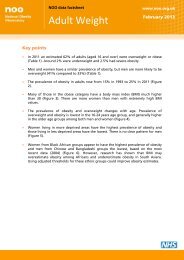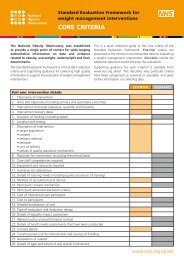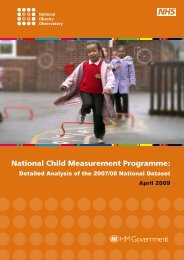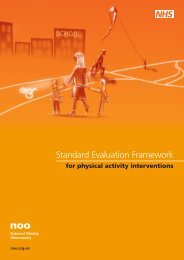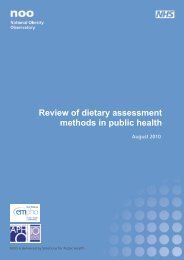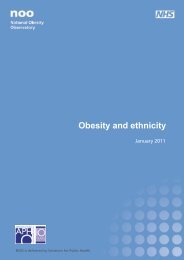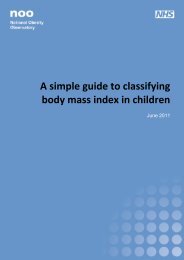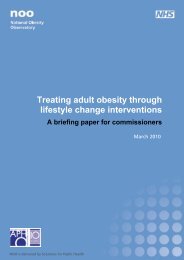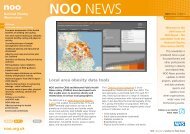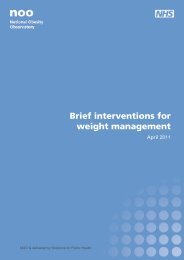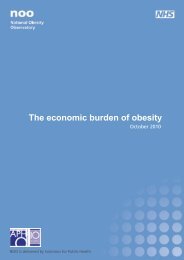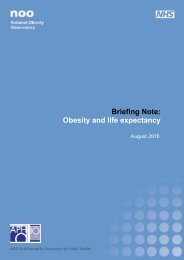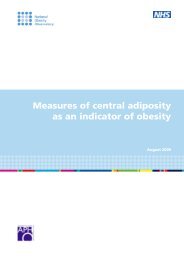Knowledge and attitudes towards healthy eating and physical activity:
Knowledge and attitudes towards healthy eating and physical activity:
Knowledge and attitudes towards healthy eating and physical activity:
You also want an ePaper? Increase the reach of your titles
YUMPU automatically turns print PDFs into web optimized ePapers that Google loves.
iii. Attitudes to <strong>healthy</strong> <strong>eating</strong><br />
The Food St<strong>and</strong>ards Agency’s (FSA) Consumer Attitudes Survey 2008 found that 87%<br />
of respondents either agreed or strongly agreed with the statement: ‘<strong>eating</strong> healthily<br />
is very important to me’. Healthy <strong>eating</strong> was also considered to be either ‘very<br />
important’ or ‘fairly important’ to 75% of adults in the LIDNS 2005. These data<br />
suggest that food, diet <strong>and</strong> <strong>healthy</strong> <strong>eating</strong> are considered to be important <strong>and</strong><br />
relevant by the majority of people, although it is likely that these data may be subject<br />
to response bias.<br />
The HSE 2007 asked adults to state how strongly they agreed with six statements<br />
relating to their <strong>attitudes</strong> to <strong>healthy</strong> <strong>eating</strong>. Multiple responses could be selected from<br />
a list of options. The results showed that there were differences in <strong>attitudes</strong> between<br />
men <strong>and</strong> women. Significantly higher proportions of women than men believed that<br />
‘<strong>healthy</strong> foods are enjoyable’ (80% <strong>and</strong> 66% respectively), <strong>and</strong> agreed that ‘I really<br />
care about what I eat’ (74% <strong>and</strong> 64% respectively). Conversely, a significantly higher<br />
proportion of men felt they ‘get confused over what’s supposed to be <strong>healthy</strong> <strong>and</strong><br />
what isn’t’ (30% of men <strong>and</strong> 24% of women) <strong>and</strong> believed ‘if you do enough exercise<br />
you can eat whatever you like’ (20% of men <strong>and</strong> 14% of women).<br />
The HSE 2007 also found that 37% of people believed that ‘the tastiest foods are the<br />
ones that are bad for you’, with those with a BMI over 25 significantly more likely to<br />
agree with this statement than those with a BMI within the <strong>healthy</strong> range. This<br />
finding suggests that presenting <strong>healthy</strong> foods as an enjoyable option may increase<br />
the likelihood of them being selected, particularly among those in the higher BMI<br />
categories.<br />
The TGI survey also asked questions about people’s <strong>attitudes</strong> <strong>towards</strong> <strong>healthy</strong> <strong>eating</strong>,<br />
the responses to which are shown in Appendix 3, Table 2. The data show that people<br />
who were underweight were significantly less likely to consider their diet to be very<br />
<strong>healthy</strong>, <strong>and</strong> people who were obese were significantly more likely to consider that<br />
they ‘should do a lot more about their health’ compared with the whole sample.<br />
iv. Confidence in changing diet<br />
The HSE 2007 asked respondents how easy or difficult they would find it to make<br />
improvements to the way they eat. The majority of respondents (56.3%) believed that<br />
making improvements to their diet would be very easy or quite easy. This response<br />
was unaffected by weight status.<br />
However, respondents who were obese or morbidly obese were significantly more<br />
likely to report that they would find it difficult to make changes to their diet than<br />
those with a <strong>healthy</strong> weight. This finding suggests that successfully identifying <strong>and</strong><br />
reducing barriers to change for these groups may have a positive impact on their diet.<br />
See Appendix 3, Table 3.<br />
v. Barriers to <strong>healthy</strong> <strong>eating</strong><br />
Both the HSE 2007 <strong>and</strong> the LIDNS 2005 asked questions about barriers to improving<br />
<strong>eating</strong> habits. The HSE provided a list of 11 options including the categories<br />
‘something else’ <strong>and</strong> ‘none of these’, from which respondents could choose all that<br />
applied. The most commonly reported barriers to <strong>healthy</strong> <strong>eating</strong> in the HSE 2007 were<br />
‘it’s hard to change my <strong>eating</strong> habits’ (29%), ‘I don’t have enough time’ (27%) <strong>and</strong> ‘it<br />
costs too much’ (20%).<br />
NOO | <strong>Knowledge</strong> <strong>and</strong> <strong>attitudes</strong> <strong>towards</strong> <strong>healthy</strong> <strong>eating</strong> <strong>and</strong> <strong>physical</strong> <strong>activity</strong>: what the data tell us 11



